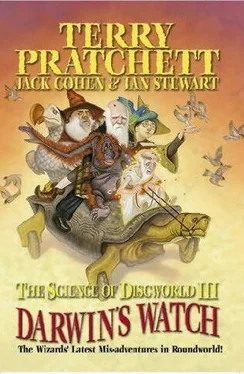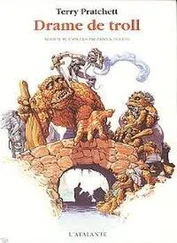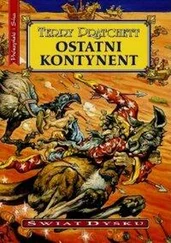Terry Pratchett - Darwin's Watch
Здесь есть возможность читать онлайн «Terry Pratchett - Darwin's Watch» весь текст электронной книги совершенно бесплатно (целиком полную версию без сокращений). В некоторых случаях можно слушать аудио, скачать через торрент в формате fb2 и присутствует краткое содержание. Жанр: Фантастика и фэнтези, на английском языке. Описание произведения, (предисловие) а так же отзывы посетителей доступны на портале библиотеки ЛибКат.
- Название:Darwin's Watch
- Автор:
- Жанр:
- Год:неизвестен
- ISBN:нет данных
- Рейтинг книги:3 / 5. Голосов: 1
-
Избранное:Добавить в избранное
- Отзывы:
-
Ваша оценка:
- 60
- 1
- 2
- 3
- 4
- 5
Darwin's Watch: краткое содержание, описание и аннотация
Предлагаем к чтению аннотацию, описание, краткое содержание или предисловие (зависит от того, что написал сам автор книги «Darwin's Watch»). Если вы не нашли необходимую информацию о книге — напишите в комментариях, мы постараемся отыскать её.
Darwin's Watch — читать онлайн бесплатно полную книгу (весь текст) целиком
Ниже представлен текст книги, разбитый по страницам. Система сохранения места последней прочитанной страницы, позволяет с удобством читать онлайн бесплатно книгу «Darwin's Watch», без необходимости каждый раз заново искать на чём Вы остановились. Поставьте закладку, и сможете в любой момент перейти на страницу, на которой закончили чтение.
Интервал:
Закладка:
`Oh no,' said the God of Evolution, hurrying back inside, `not the whales!'
Darwin was silent as they walked to the beach. He was even more silent as they passed the wheeled tortoise, which was limping in circles. The silence was deafening when Ponder summoned Hex. When they appeared in the Great Hall his silence, apart from a brief scream during the actual travelling, was a huge infectious silence that was contagious.
The assembled wizards shuffled their feet. Dark rage radiated off their visitor.
`How did it go, Stibbons?' whispered Ridcully.
'Er, the God of Evolution was his usual self, sir.'
`Was he? Ah, good-'
`I wish, very clearly, to awaken from this nightmare,' said Darwin, abruptly.
The wizards stared at the man, who was quivering with rage. `Very well, sir,' Ridcully said quietly. `We can help you wake up. Excuse us a moment.'
He waved a hand; once again the blue shimmer surrounded their visitor. `Gentlemen, if you please?'
He beckoned to the other senior wizards, who clustered around him.
`We can put him back without him having any memory of anything that happened here, right?' he said. `Mr Stibbons?'
`Yes, Sir. Hex could do it. But as I said, sir, it wouldn't be very ethical to mess around with his mind.'
`Well, I wouldn't like anyone to think we're unethical,' said Ridcully firmly. He glared around. `Anyone object? Good. You see, I've been taking to Hex. I'd like to give him something to remember. We owe him that, at least.'
`Really, sir?' said Ponder. `Won't it make things worse?'
`I'd like him to know why we did all this, even if it's only for a moment!'
`Are you sure that's a good idea, Mustrum?' said the Lecturer in Recent Runes.
The Archchancellor hesitated. `No,' he said. `But it's mine. And we're going to do it.'
A LACK OF SERGEANTS
WHAT WAS IT ABOUT VICTORIAN ENGLAND, and what led up to it, that made it so progressive, inventive and innovative? Why was it so different from Russia, China, and all the other nations that seem to have stagnated during the nineteenth century - accumulating wealth, but lacking a middle class full of engineers, sea captains, clerics, and scientists? We would not expect there to be one simple answer, one trick that Victorian England discovered but other nations did not. That would satisfy the innate human wish for a single thin causal chain, but as we've seen, history doesn't work like that.
Equally, though, it's unsatisfying just to list lots of possible contributory causes - the East India Company ... Harrison's excellent chronometer, which helped to make the British Empire so profitable and made aristocratic families send their younger sons fairly safely out into the Empire, from which they came back wiser and richer ... Quakers and other nonconformist sects, which were tolerated by the Anglican Church ... the Lunar Society's progeny, including the Royal Society and the Linnaean Society ... the College of Apprentices ... Parliament and the pretence of democracy, so that a middle class could rise from the merging of junior aristocrats who came back from the Empire to found pickle factories in Manchester ... artisans who were coming into towns looking for satisfying jobs.
We could make the list ten times longer, though in most cases we wouldn't be sure about genuine causal connections. And even with ten times as many `causes', we would still have to say `all of the above'.
Are such factors a cause of historical differences, or a consequence? That's not a sensible question if you insist on a yes/no answer - very probably the answer should be `both'. A modem analogue would be to ask whether today's space-oriented engineers and scientists are a cause of the success of space films and nailed-down science-fiction stories - or did the early scientifically oriented SF stories, with their sense of wonder at the sheer vastness and mystery of outer space, fire those engineers, when young, with the desire to turn fiction into fact? It must have been both, of course.
The early Victorian apprentices in pottery, ironworking, brick firing, and even bricklaying were respected by, and respected, their masters. Together they laid down enduring monuments for future generations. Similarly, early trains and canals connected all the major cities, and connected factories to their suppliers and customers. This transport system paved the way to the wonderful economic network that Edwardian Britain inherited from the Victorians. These systems were not static, to be admired for what they had achieved. They were dynamic, they changed, they were processes as much as achievements. They changed the way succeeding generations thought about where and how they lived. Even today, our cities rely heavily on what the Victorians built, especially when it comes to sewerage and water supplies.
The resulting changes in thinking fuelled further changes. The combination of cause and consequence is an example of what we have elsewhere called complicity.[1] This phenomenon arises when two conceptually distinct systems interact recursively, each repeatedly changing the other, so that they co-evolve. A typical outcome is that
[1] See Jack Cohen and Ian Stewart, The Collapse of Cbaos (Viking, 1994).
together they work their way into territory that would have been inaccessible to either alone. Complicity is not mere `interaction', where the systems join forces to achieve some joint outcome, but are not themselves greatly affected as a result. It is far more drastic, and it changes everything. It can even erase its own origins, so that neither of the original separate systems remains.
The social innovations that were (arguably but not solely) triggered by Victorian ingenuity and drive are just like that. Because there was selection, and because the best growth often occurs in the best run and best designed parts of growing systems, there was recursion. The next generation was inspired by the previous generation's successes, and their noble mistakes, and built a better world. What we might call the Channel Tunnel Syndrome occurs quite often in capitalist, democratic societies, but not in totalitarian states or even in nations like, say, today's Arab states or twentieth-century India. And particularly not in nineteenth-century Russia or China: both were rich, but they had no respectable middle class.
The Victorian middle class was respected both by the workers whose lives they exploited - and opened up - and by the aristocrats, whose increasingly international outlook was progressively integrated with trade. Russia and China had political systems without an economically powerful, shareholding middle class, which could start or follow fashions, and support romantic, visionary ventures. Today, the British will still support a Channel Tunnel venture or a Beagle-2 Mars lander, because such things are romantic and possibly heroic, even though they are unlikely to be very profitable. A lengthy historical record shows very clearly that the first attempt at any major tunnel usually collapses financially - though after the tunnel is successfully built - often after a long series of attempts to shore up a failing enterprise. Then the ruins are bought for a song, occasionally nationalised or considerably financed by government or some other major capital source, and the resulting business can stand on the shoulders of the first. Only some rather strained economics has so far kept the original companies involved in the Channel Tunnel in business, at least on the British side of the Channel where everything was done by private enterprise.
Some projects are so romantic, so attractive in concept but so very difficult in execution, that three or four attempts are needed for them to acquire momentum. It is recursive structure of the complicit kind that keeps them afloat.[1] Telford's bridges are famous, as are so many of his other engineering works; his ability to capitalise on his successes was the result, and the cause, of his fame, which was achieved by what would now be called `networking' among aristocrats, government ministers, and pickle manufacturers. He was, as they said, famous for being famous. In America similar enterprises were measured more by the anticipated financial return, the `bottom line'. So John D. Rockefeller, Andrew Carnegie, and their ilk were worth supporting because your investment was guaranteed to multiply, rather than because the enterprise was exciting `for Queen and Country'. Early twentieth-century America had gigantic, monolithic Ford ... while England had a variety of small engineering concerns like Morris Garages (MG).
Читать дальшеИнтервал:
Закладка:
Похожие книги на «Darwin's Watch»
Представляем Вашему вниманию похожие книги на «Darwin's Watch» списком для выбора. Мы отобрали схожую по названию и смыслу литературу в надежде предоставить читателям больше вариантов отыскать новые, интересные, ещё непрочитанные произведения.
Обсуждение, отзывы о книге «Darwin's Watch» и просто собственные мнения читателей. Оставьте ваши комментарии, напишите, что Вы думаете о произведении, его смысле или главных героях. Укажите что конкретно понравилось, а что нет, и почему Вы так считаете.












